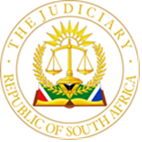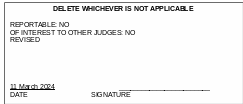
IN THE HIGH COURT OF SOUTH AFRICA
GAUTENG LOCAL DIVISION
HELD AT JOHANNESBURG
CASE NO.: 33936/2016

AFRICAN BANKING CORPORATION
OF ZAMBIA LIMITED First Applicant
/First Defendant
AFRICAN BANKING CORPORATION
OF BOTSWANA LIMITED Second Applicant/
Second Defendant
STANDARD CHARTERED BANK
LIMITED JOHANNESBURG BRANCH Third Applicant/
Third Defendant
STANDARD CHARTERED BANK
LIMITED BOTSWANA LIMITED Fourth Applicant /
Fourth Defendant
and
MAPULA SOLUTIONS (PTY) LTD Plaintiff /Respondent
JUDMENT – APPLICATION FOR LEAVE TO APPEAL
Victor J
[1] The applicants, (defendants in the trial action) seek leave to appeal the judgment. The respondent (plaintiff in the trial action) was granted judgment in the sum of R704 968 234.00, interest, and various costs orders. For convenience the parties will be referred to as in the trial action.
[2] The judgment sets out fully, the history of the matter, an evaluation of the evidence proffered on behalf of the parties, and an evaluation of the evidence given by the parties’ respective experts.
[3] The application for leave to appeal consists of over 100 pages. This leave to appeal judgment will deal with the core issues upon which leave is sought. Because the evidence and the various heads of argument comprise hundreds of pages, it will be easier to identify the defendants’ core issues and the plaintiff’s response under the headings that follow.
Failure to address certain issues and defences in the judgment.
[4] The judgment deals adequately with the central defences raised by the defendants. It is correct that litigants are entitled to a decision on issues raised. This principle has importance especially where there is an option of appealing further. However, it is unnecessary for a court of first instance to deal with every minute bit of evidence which is not material to the core issues that have been pleaded by both parties. Similarly, a court of first instance when dealing with the defences will ultimately in its evaluation of the evidence, traverse aspects that cover the defences and this was done.
[5] In addressing the pleaded issues, the court’s analysis of the evidence provided by the plaintiff covered the issues necessary to be dealt with. The defendants did not produce any persuasive evidence which supported their defences on the facts and upon the application of the law. It is trite that sufficient reasons have to be provided to enable the losing party to take an informed decision as to whether or not to seek leave to appeal. This is clear from a proper application of the principles in Mphahlele v First National Bank of SA 1
[6] In this case the defendants failed to provide sufficient and adequate evidence in respect of their defences. They took an approach not to call witnesses on the merits and wrongly relied largely on the cross examination of Mr Meiring to prove their defences. Mr Meiring who testified on behalf of the plaintiff, I found to be a thorough, consistent and credible witness despite days of tough and aggressive cross examination. The defendants also relied on SENS announcements and other documents to bolster their defences, as also the judgments in other courts such as Zambia and the Gauteng Local Division of the High Court. In evaluating the evidence of the defendants’ expert, the court found that it lacked objectivity and scientific rigour. Ample reasons were provided.
The judgment deals with all these issues fully and the defendants are not prejudiced in their ability to appeal.
Causation
[7] On the question of causation, the defendants contend that the court failed to deal with these issues in a way that enables them to determine the impact on the casual link between the breaches of the DRA and the plaintiff’s loss of its investment. There was extensive assessment in the judgment on the plaintiff’s pleaded case and the evidence presented by it showing that the investment of Mayibuye was lost on 1 November 2013 as a result of the defendants’ breaches of the terms of the Debt Rescheduling Agreement (DRA). The evaluation of the evidence of Mr Meiring and the expert Mr Lange by the court, although challenged could not rebut the cause of the loss. The evidence of the defendants’ expert was unfortunately unsatisfactory and did not reach the required threshold of an unbiased witness. Based on the proven facts another court will not find differently.
Locus Standi
[8] The Locus Standi question was amply dealt with in the judgment based on the facts and the proper application of the law to the facts. Another court would not come to a different conclusion on the question of locus standi.
Reflective Loss basis
[9] Another court will not come to a different conclusion on the defendants’ assertion that the claim by Mayibuye was a reflective loss claim and thus was not allowed to proceed. The defendants’ contentions are simply wrong. This is a claim for a loss of an investment and is the only claim allowed by Swanepoel AJ.
Breaches
[10] The breaches of the DRA were proven by the plaintiff as also the contagion principle and the orchestrated approach by the defendants. The evidence of Mr Meiring which the court accepted, as also the effect of the various court applications and the minutes of the Lender Committee amounts to evidence which was and could not be undermined by the defendants.
Inoperability of the DRA
[11] The issue was not pleaded and the plaintiff correctly submits that the issue was only dealt with in the rebuttal argument. Accordingly, another court cannot make a finding on an issue which was not properly pleaded.
Quantification of the claim
[12] The plaintiff’s expert met the rigorous scientific threshold required to deal with the quantification of the damages. The defendants’ expert relied on hypotheses and some of it based on incorrect facts. Another court will not find differently.
Costs
[13] The defendants appeal the costs order made by the court. In respect of each issue relevant to costs, such as the causes of the postponements, the admission of nine witness statements timeously and the success of the plaintiff, another court would not come to a different conclusion. No exceptional circumstances have been presented by the defendants to grant leave to appeal on the question of costs.
Reasons to grant leave to appeal.
[14] The law pertaining to the threshold to grant of leave to appeal is now clearly embedded in our jurisprudence. On the question of reasonable prospects of success on appeal, Shongwe JA in S v Notshokovu and Another stated “An appellant, on the other hand, faces a higher and stringent threshold”. 2 In addition, following upon the dicta in the case of Ramakatsa and Others v African National Congress and Another3 there must be facts and law which could reasonably persuade an appeal court to arrive at a conclusion different to that of the trial court. Only then will there be reasonable prospects of success on appeal. Once Mr Meiring was accepted as credible witness, together with the plaintiff’s expert Mr Lange and documentation which could not be disputed, this means the defendants have not reached the necessary threshold for this court to grant leave to appeal.
[15] A further basis for granting leave means that there must be compelling reasons to grant leave to appeal. The assertion by the defendants that there are conflicting judgments on the question of a reflective loss is without merit. The facts found to be proven in this case are that Mayibuye’s investment was lost. Accordingly, there is no basis for the defendants’ submission that the plaintiff proceeded in this trial on a reflective loss basis which Swanepoel AJ had excluded. There are no conflicting judgments on the point that an actual cause of action must be ignored. The facts have to be taken into account.
[16] Further, there are no aspects of public policy justifying the grant of leave to appeal.
[17] The defendants’ submission that there are three court judgments holding that the third defendant’s conduct did not amount to a breach of the DRA, whilst this court found that it did breach the DRA is without merit. The causes of action and the findings or implied findings of those courts do not support this submission by the defendants. The submission is without merit. The findings in those cases do not support the defendants’ contention that the courts made findings that they did not breach the DRA.
[18] This court has found that the orchestrated conduct of all the defendants, based on facts that could not be disputed, amounted to a breach of the DRA. The evidence of Mr Meiring, the various court cases, the opinion of the plaintiff’s expert and the minutes of the Lender Committee are manifestly evidence of the orchestrated breaches by the defendants. Another court would not come to a different conclusion on the undisputed facts.
[19] The application for leave to appeal is dismissed with costs, including the costs of two counsel.
________________________
JUDGE M VICTOR
11 March 2024
Signed electronically
Not reportable
Counsel Plaintiff Adv CM Eloff SC
Counsel Plaintiff Adv A R G Mundell SC
Counsel for Defendant Adv J P Daniels SC
Counsel for Defendant Adv K Premhid
1 1999 (2) SA 667 (CC).
2 [2016] ZASCA 112 (7 September 2016)
3 (Case No. 724/2019) [2021] ZASCA 31 (31 March 2021) at paragraph 10
8
